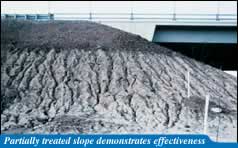

 |
As the use of compost/mulch continues to increase, it has been discovered that it is highly effective in reducing many forms of erosion. Repeated studies by the EPA, DOT's, and numerous field demonstration are all presenting overwhelming data that an organic compost/mulch has superior performance characteristics and numerous long-term benefits that few of the existing erosion and sediment control products have. A compost/mulch blanket application will greatly reduce splash and rill erosion while giving the soil the ability to infiltrate more water. So rather than discharging the water down slope and into some type of conveyance system the compost/mulch effectively absorbs, stores and slowly discharges the water at a reduced rate. This is very beneficial when establishing vegetation, restoring ground water or cutting back irrigation needs. The inherently black/dark brown color of compost combined with it's microbial and thermophillic properties give it the ability to dramatically increase germination rates and expand seeding dates. Increased microbial activity, soil tilth, and biology are components that have to be considered in the long-term effectiveness of the product and the reduction in the overall cost of each project. Compost/mulch filter berms have been proven to out perform the traditional sediment control BMP's (sediment/silt fence), by an overwhelming margin. EcoBerm® and EcoBlanket® have both been laboratory tested to be 99+% effective at retaining sediment. Other long term benefits of both berms and blankets include the diversion of recyclable materials out of landfills, a reduction in the use of petroleum based erosion control materials, decreased use of synthetic fertilizers, and low or zero disposal costs that are normally associated with products such as silt fence.
  |
 Many of these benefits have been known for years and the primary barrier to acceptance was the economics of spreading the material at an efficient cost and rate. Several companies are now manufacturing equipment that allows compost and mulch to be spread at a uniform depth and at a rate that is lower in cost than most of the traditional methods.
Many of these benefits have been known for years and the primary barrier to acceptance was the economics of spreading the material at an efficient cost and rate. Several companies are now manufacturing equipment that allows compost and mulch to be spread at a uniform depth and at a rate that is lower in cost than most of the traditional methods.